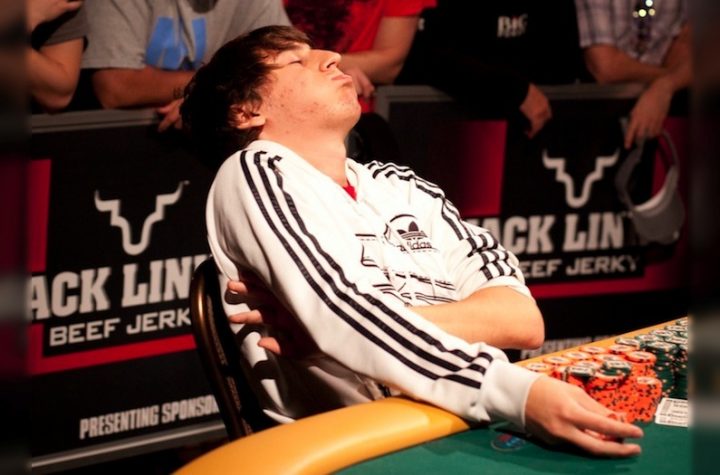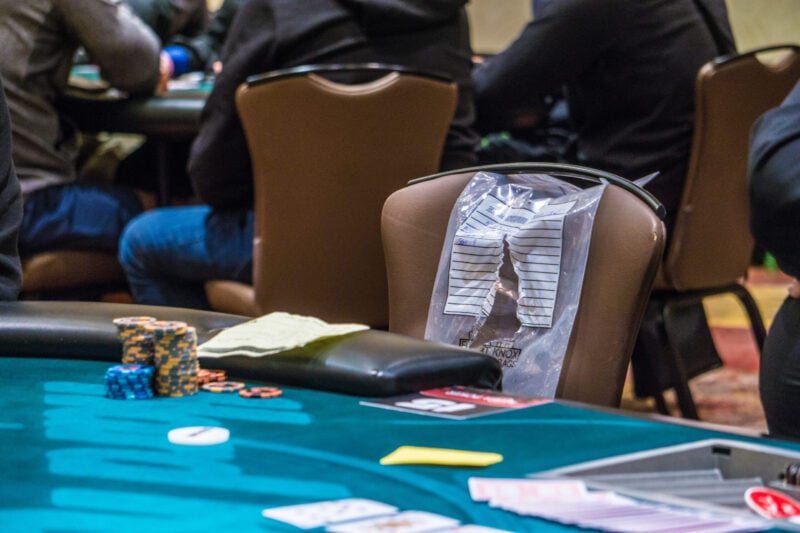I’ve played in hundreds of venues, for tens of thousands of hours, against thousands of opponents. I’ve heard enough stories to fill a multivolume encyclopedia and I’ve generated nearly as many of my own. The poker world is filled with tons of opinions and advice about a myriad of poker topics. Some of it is good, some of it is awful.

One of the worst bits of poker “wisdom” that I’ve read over the years has to do with the best length of a poker session. Typically, poker strategy writers suggest that you stay in a game as long as it’s “good.” I’d like to take issue with that. I think it’s terrible advice for all but the most accomplished and disciplined players. For the vast majority of us, it may well lead us to poker ruin.
Judging by the practice of poker players, the vast majority believe that long sessions make sense. Ask a player why he is still in a game after eight hours and he’s likely to tell you that he can’t leave because the game is just “too good.” He’s almost surely wrong.
I’d say that 5-10 hours at a time seems to be the norm for the serious player. They arrive at a public poker room with the intent of staying for at least the bottom end of that range and, on average, they stay for as long as the top end of that range – almost always longer than they have planned.
Much depends on whether they win early or late in their session. It may vary by age and their distance from their nearest poker room. But most sessions tend to last five hours or more – some much, much more.
My opinion is that most people – the vast majority of poker players – are wrongheaded about how long to play. Simply put, from a strictly financial perspective, most players plan to stay too long and end up staying even longer. With few exceptions, their poker bankrolls would be better off if they left sooner.
Focus and intent tend to wane
Think about your own play. When you arrive, aren’t you filled with the lessons you’ve reviewed since your last session? Don’t you come armed with your intent to win, your intent to cast off your bad habits, and your intent to stay focused? You probably start off disciplined and observant.
But this mental vigilance is impossible to fully preserve for very long. Our minds tend to wander and our play tends to become more automatic. While it’s true that we get a better idea of how other people play after watching them for a while, there’s little new that we’re learning about them after the first hour or two.
Rather, our rigorous intent tends to fade as we ease into our habitual play. We don’t remain fully focused indefinitely. We’re not hyper-vigilant about casting away our bad habits. We can’t be. Maintaining keen mental focus is just too damn difficult after a while.
If we’re highly skilled and experienced, our normal and habitual play may still be at a relatively high level. But it’s almost surely lower than the one we started with when we were fresh and fully focused.
Emotions tend to be less restrained when we’re weary
When we’re tired, we’re less able to control our emotions. It’s just human nature. It takes energy to keep our emotions in check and when a long session has sapped us of some of that energy, our emotions are more likely to get the better of us. Those emotions can override the rational decision-making that ensures we play our best game.
At their worst, those emotions, left unchecked, can cause us to tilt, allowing for outbursts of emotionally-driven play. That surely hurts our game.
We’re less able to recognize a bad game
If you’re a thoughtful player and have read even a modest amount of poker literature, you surely understand how some games are better than others. We win money more easily from bad players and players playing badly than from good players playing well. Ideally, we want to find games with many bad players. Poker strategy writers sometimes recommend staying in a game for as long as it’s good without setting win limits, loss limits, or time limits.
The problem is that after playing for a long while, even a very good player may fail to be able to recognize when a game is good. This is true for two reasons. First, like a frog in a gradually heating body of water, the good player may not have noticed the incremental changes to the game that have been occurring over a long period of time.
Second, his own judgment is likely to be diminished because of that long session, rendering him incapable of evaluating the diminishment of his own skills or how his opponents are outplaying him.
When the measuring stick itself changes, it’s hard to take an accurate measure of the game.
We tend to become fatalistic about our losses and cavalier about our winnings
The last $100 is often a lot easier to lose than the first $100. Players tend to part with it much more easily. Once $900 is lost out of a $1,000 stack, losing the remaining $100 seems inevitable.
Similarly, after many hours of play, many players tend to treat their winnings more casually than they treated their starting stack thinking that if they lose some of their winnings, at least they’re ahead for the session.
This is at least partially the product of the mental laziness that tends to creep in after playing too long.
We go on autopilot
Veteran players bring all sorts of habits of play to the game. We tend to do certain things, whether they’re in our best interests or not.
While we’re fully alert and engaged in the game, we balance these habits with intentional behavior based on our read of each new poker situation. This thoughtful poker is our best game as we constantly re-evaluate the ever-changing landscape of the game and apply our skills strategically. But this form of our game – our best form – takes a lot of mental energy. And so, naturally, as our energy wanes, so too does our ability to constantly evaluate the situation and apply ourselves to address it individually.
For some of us, our habitual B game is still pretty good and we get by. But it isn’t our A game and we aren’t maximizing our profit. Eventually, even this B game deteriorates if we stay too long.
Eventually, we aren’t beating the rake and could even be losing money while hoping for some miracle hand so we can leave even.
Conclusion
Short sessions allow players to play their A game for the entire duration of their stay. This increases the likelihood that they will be able to take advantage of all of the unique situations they’ll encounter as their focus, skill, and intent won’t be diminished from staying too long.
While it’s surely true that good players want to take advantage of bad players by finding good games, a good player’s ability to assess how good the game is diminished over time. Advising him to stay for as long as the game is good may cause him to stay well past the point where his skills — and the game in general — have turned bad.
It’s better to set a time limit, with a plan to at least leave the table for a while, to allow the good player to recharge his batteries while assessing how good his skills are and whether he has what it takes to continue to beat the game.


